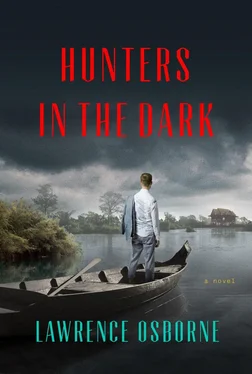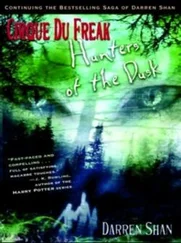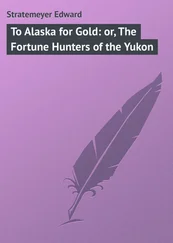A godsend, the coffee.
The man grinned and made a playful salute with one hand. Robert unscrewed the thermos’s cap and fell gratefully into the coffee. He sipped it cautiously at first then took larger mouthfuls.
Instantly, he revived. They were on a vast toffee-colored lake. Across it a saline wind swept, warm and menacing, and far off on the horizon he could see systems of nets laid low against the water. There was no land to be seen, they had left it far behind.
He sat half in the sun and gulped down the whole thermos. It was only gradually that he became aware that he was wearing clean clothes and that they were not his. He looked down and spread his hands over his warm lap. He was wearing off-white linens, freshly laundered. He felt in the pockets and there was a hundred-dollar bill. The shirt was a soft dark cream linen with heavy buttons. He got up and turned once as if looking at himself in a mirror. Incredible. Espadrilles too.
He called out to the pilot.
“Where is Simon?”
The man waved a silent hand but didn’t turn again.
All right, Robert thought, he doesn’t speak a word of English. That’s to be expected, I suppose.
He took out the hundred-dollar bill and looked it over. Then he thought about his backpack. It was nowhere to be seen on the deck.
“So that’s it,” he said aloud.
Exhilaration came upon him, and then a back-pedaling panic.
He leaned against the boat’s side and let his senses clear and soon he saw low shimmers of green on the leftward horizon. It’s a small country, he thought, and no one is more than four hundred miles from anyone else. For some reason he didn’t yet care about the backpack and yet he knew instinctively that it was not on the boat and that there was no use looking for it. There was no point asking the pilot about it and there was no point asking him to take him back to the house by the river. He did not even know where the house was or where the jetty was or what the river was called. He would never be able to find it, and the pilot would never take him anyway even if he understood.
He lumbered to the rear of the boat and looked down into the toffee waters being churned by the motor. A five-mile swim in any direction. He shaded his eyes and saw that the shimmers of jungle on the horizon were in any case coming closer. But there was no way of calculating how long he had been on board this boat, or for how many hours they had been plowing through this featureless wasteland. It could have been for several hours. It could, for that matter, have been for half the night. There was no way of knowing. Nor was there any way of knowing if a gentlemanly favor had been done him, or the reverse — one barang gentleman to another.
—
Toward noon, to judge by the position of the sun (he had no watch, he discovered) the boat began to near land — the same low forest and waterlogged banks of reeds and flat grass — and soon he saw people walking along a road, bicycles flashing in the sun.
The pilot turned to him and said something, the name of a place perhaps, Prek Pnov, and he stood up and walked to the bow, which would touch land. There were long shelving banks of dirty wet grass and reeds, and above them a scrim of slum shacks made of tin. There were a few children with mechanical toy birds and fishing rods standing at the tip of a line of planks that led up from the water’s edge into the shanty. It was not quite the city but over the slum and the river soared a modern bridge which suggested its presence. The thick dust of the country roads hung above Prek Pnov, the dust which dries in an hour and then rises to envelop the head, and through it he could see the gold tints of a ramshackle wat covered with wooden scaffolding and high sad trees caked with cement powder.
When the boat came to, Robert stepped onto the planks and looked down at the mysterious pilot, who seemed unconcerned. This was not a stop that any commercial boat would use; it must have been a secretive place that Simon used to get ashore while going about his equally secretive business.
“Where’s Simon?” Robert asked again, but now more clearly and forcefully. “Where’s my bag?”
The pilot smiled with a vast charm.
He had already unmoored the boat again and the craft was moving away from the path of planks as suddenly as it had arrived. As it did so the children closed in on Robert and began to pester him. One dolla, one dolla.
“Oh, OK then,” Robert called after the pilot, “you dump me here and then you just leave like that? Just like that? What am I supposed to do now?”
The pilot waved cheerfully. Nothing to be said or expressed, just the fact and the consequences that sprang from it.
“Come back,” Robert shouted after him, waving too, but not in the same friendly way. “Come back right now!”
He knew already that no such thing could happen. The men in the cluster of longtails below him stared and slowly their ironic smiles gained traction in Robert’s mind and he desisted. “Damn and fuck it,” he muttered and brushed past the children and began to climb the precarious gangplank through slopes of colorless plastic trash. The planks snaked through shacks on stilts, up into the shadow and heat of a single alley that wound its way through the slum.
He was just at a loss, and aboard the boat he had not been able to think anything through. He moved as an automaton until he was clear of the river and he thought wildly, in great leaps: go back up the river by car and find the house again or press on and see what happened. But there was no sense in going back, he knew there was nothing behind him and, far more importantly, he didn’t want to go back. Secretly, he was thrilled. From now on he could tell himself that he was a victim of circumstance.
He laughed and the people out on the alley sitting around with their lunch saw it and laughed along immediately. It was the Khmer way. Their surprise was not melodramatic. It came out in that subdued collective laughing. He was in an alley filled with little shops and two-story houses where the balconies were crowded with makeshift altars of bowls of fruit and decorative piles of beer cans. Great round earthenware urns stood outside the doors. As he turned and decided to walk to the right, his head narrowly missed a line of tiny fish impaled on a wooden pin that dangled from an awning rod. The children burst into laughter. He ducked and laughed along and moved awkwardly toward the cheap gold chedi of the temple which he could see over the roofs.
The wat looked like a half-abandoned construction site. But there were gold guardian lions erect and snarling in the sun and chedi which had been restored. The naga heads on the stairs had been repainted gold and green and there were smaller lions posted on the roofs. He walked in, seeing nobody and now no longer followed by the children, passing venerable trees whose shade covered a ground of rubble and grass.
He came out onto the road, and he could sense at once that it was the main route into the city. In fact it was the Battambang highway. Chaotic traffic pressed through it, a medley of motorbikes in swarms. The sun beat down on tangled cables and pink bricks and forlorn flag posts.
He walked along the dust bordering the tarmac until he came to a small shop with a curious sign for a thing called “Alexand” brandy with a black head of a Greek warrior. He stepped into its shade and felt the sweat and burn on his skin. He cashed in the hundred-dollar bill for an Angkor beer. As he stood by the road, tuk-tuks and motodops began to stop. In his nice linens he appeared a profitable target but he soon beat the motodops down to five dollars for the run into town. Since he had no baggage they assumed he lived there. No, he said, I’ll go to a hotel, you know one? The motodops were not as wise to the hotels as the tuk-tuks but they knew a few flophouses.
Читать дальше












